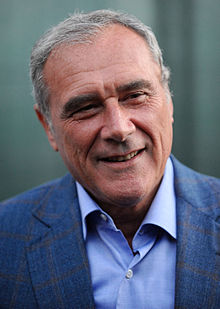Pietro Grasso
| Pietro Grasso | |
|---|---|
 |
|
| President of the Senate | |
|
Assumed office 16 March 2013 |
|
| Preceded by | Renato Schifani |
|
President of Italy Acting |
|
|
In office 14 January 2015 – 3 February 2015 |
|
| Prime Minister | Matteo Renzi |
| Preceded by | Giorgio Napolitano |
| Succeeded by | Sergio Mattarella |
| Head of the National Antimafia Directorate | |
|
In office 11 October 2005 – 27 December 2012 |
|
| Preceded by | Pierluigi Vigna |
| Succeeded by | Giusto Sciacchitano |
| Personal details | |
| Born |
1 January 1945 Licata, Italy |
| Political party | Democratic Party |
| Spouse(s) | Maria Fedele (1970–present) |
| Children | 1 son |
| Alma mater | University of Palermo |
Pietro Grasso (Italian pronunciation: [ˈpjɛːtro ˈɡrasso]; born 1 January 1945), also known as Piero Grasso, is an Italian anti-mafia magistrate and politician who has been President of the Italian Senate since 16 March 2013. Grasso became Acting President of Italy on 14 January 2015, upon the resignation of President Giorgio Napolitano. He served as Acting President until the swearing in of Sergio Mattarella on 3 February, as the new President.
In 1984 he was appointed associate judge in the first maxiprocesso to Cosa Nostra (10 February 1986 – 10 December 1987), with 475 defendants. Pietro Grasso, next to the presiding judge Alfonso Giordano, was author of the judgment (over 8000 pages) that inflicted 19 life sentences and more than 2,600 years in prison.
Ended maxiprocesso, Grasso was appointed consultant to the Anti-Mafia Commission, at the head of Gerardo Chiaromonte first and then by Luciano Violante. In 1991 he was appointed adviser to the criminal affairs department of the Ministry of Justice, whose minister was Claudio Martelli, whom he named Giovanni Falcone, and member of the Central Commission for the repentant.
It is then replaced in his role, until he was appointed deputy prosecutor at the National Anti-Mafia Directorate (led by Pier Luigi Vigna), applied in the Procure of Palermo and Florence, where he supervised and coordinated the investigations on the massacres of 1992 and 1993.
In Palermo by the Public Prosecutor in August 1999, under his direction, from 2000 to 2004, 1,779 people were arrested for crimes of mafia fugitives and 13, which were included in the 30 most dangerous. During the same period, the prosecutor of Palermo scored 380 life sentences and hundreds of sentences about a total of thousands of years in prison.
...
Wikipedia
